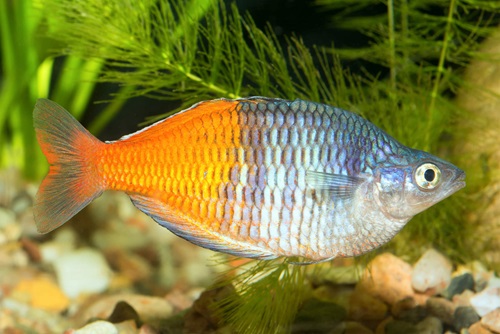Hard water can harm aquarium fish and cause stress, illness, and even death in certain species. It is crucial to maintain the right water hardness and pH levels to ensure the health and well-being of your aquatic pets.

Credit: www.swelluk.com
Understanding Hard Water
Understanding hard water is crucial for aquarium fish owners as it can impact the health of their pets. Certain species like livebearers, Guppies, Platies, Swordtails, and Mollies can thrive in hard water, while others may suffer if kept in soft freshwater with low pH levels.
Maintaining the right water hardness is essential for the overall well-being of the fish.
What Is Hard Water?
Hard water is a term used to describe water that contains a high concentration of minerals, specifically calcium and magnesium. These minerals are naturally present in water sources such as wells and springs. The hardness of water is determined by the amount of these minerals it contains. The more minerals present, the harder the water.
Causes Of Hard Water
The primary cause of hard water is the geological composition of the area. When rainwater passes through rocks and soil, it picks up minerals along the way. These minerals dissolve in the water, making it hard. Some regions have naturally hard water due to the composition of the surrounding rocks and soil.
In addition to natural causes, human activities can contribute to hard water. Industrial activities, like mining and manufacturing, can introduce additional minerals into water sources. The use of certain fertilizers and pesticides in agriculture can also lead to higher mineral content in water.
Effects Of Hard Water On Aquarium Fish
Hard water can have both positive and negative effects on aquarium fish, depending on the species. Some fish, especially those found in certain regions of the world, have evolved to thrive in hard water conditions. Livebearer fish, such as Guppies, Platies, Swordtails, and Mollies, are known to do well in hard water. These fish are often found in Central America, where the water is naturally hard.
However, not all fish can tolerate high mineral content in the water. Fish from soft water regions, such as Discus, Tetras, and Angelfish, may struggle in hard water conditions. The minerals in hard water can affect fish by interfering with their osmoregulation, which is the process of maintaining a balance of water and electrolytes in their bodies. This can lead to health issues and stress in these sensitive species.
It is important to note that even fish that can tolerate hard water may still require some adjustments to their environment. For example, Mollies appreciate the presence of salt in their water and may suffer if kept in soft freshwater with a low pH.
An aquarium hobbyist must consider the type of fish they want to keep and the hardness of their local water when setting up an aquarium. If the water is too hard for the desired fish species, there are ways to soften it, such as using a water softener or adding specific additives that decrease the hardness.

Credit: www.youtube.com
Choosing Fish For Hard Water Aquariums
When it comes to choosing fish for hard water aquariums, it’s important to consider species that thrive in these conditions. Livebearers like Guppies, Platies, Swordtails, and Mollies do well in hard water, and some even appreciate the addition of salt.
However, it’s crucial to maintain appropriate water hardness levels to ensure the health and well-being of your fish.
If you have hard water in your area, it’s important to choose fish species that can thrive in this type of environment. Hard water contains higher levels of minerals like calcium and magnesium, which can affect the pH level of the water. Selecting the right fish for your hard water aquarium ensures that your fish will be healthy and happy in their new home.
Fish That Thrive In Hard Water
Here are some fish species that are known to thrive in hard water:
- Guppy
- Paradise fish
- Common molly
- Cichlid
- Congo tetra
- Tetra
These fish species are naturally found in habitats with high mineral content, making them well-suited for hard water aquariums. They are adaptable and can tolerate the higher pH levels associated with hard water. Their vibrant colors and interesting behavior make them great additions to any aquarium.
Factors To Consider When Choosing Fish For Hard Water Aquariums
When selecting fish for your hard water aquarium, there are a few factors you should consider:
- Water temperature: Make sure the fish you choose can tolerate the temperature of your aquarium.
- Aggression level: Some fish species may be more aggressive than others, so it’s important to choose species that can coexist peacefully.
- Compatibility: Consider the compatibility of different fish species to avoid any conflicts or overcrowding in your aquarium.
- Size: Take into account the adult size of the fish species you choose to ensure they have enough space to thrive.
- Diet: Make sure the fish species you choose have similar dietary needs and can be fed with the food readily available in your area.
Considering these factors will help you create a harmonious and balanced ecosystem in your hard water aquarium.
Acclimating Fish To Hard Water
When introducing fish to a new hard water aquarium, it’s important to acclimate them slowly to avoid any unnecessary stress. Follow these steps to acclimate your fish:
- Float the fish bag: Place the closed fish bag in the aquarium for around 15-20 minutes to allow the water temperature inside the bag to adjust.
- Slowly mix water: Open the fish bag and add small amounts of water from the aquarium into the bag at regular intervals.
- Equalize temperature: After about 30 minutes, the temperature inside the bag should be equal to that in the aquarium.
- Release the fish: Gently release the fish into the aquarium while still in the bag, allowing them to swim out on their own.
Acclimating fish to hard water will give them time to adjust and minimize the risk of shock or stress during the transition.
Softening Hard Water In Aquariums
Softening hard water in aquariums is essential for the well-being of aquarium fish. Water hardness can cause stress and even death to fish if the levels are outside the acceptable parameters. By using water softeners or choosing fish species that do well in hard water, such as livebearers, you can ensure a healthier environment for your aquarium fish.
to softening hard water in aquariums? There are a few methods you can use to achieve this. Let’s explore them further under the heading:Methods To Soften Aquarium Water
One method to soften aquarium water is by using water softeners specifically designed for aquariums. These water softeners work by exchanging minerals that contribute to hardness, such as calcium and magnesium, with sodium ions. This process effectively reduces the overall hardness of the water. Additionally, water softeners help stabilize the pH level, creating a more favorable environment for aquarium fish.Using Water Softeners
When using water softeners in your aquarium, it’s important to carefully follow the instructions provided by the manufacturer. Typically, you’ll need to add the specified amount of water softener to your aquarium water. Allow the water to circulate and mix thoroughly to ensure proper distribution of the softener. Regular water testing is crucial to monitor the effectiveness of the water softener. If necessary, perform water changes and adjust the softener dosage accordingly to maintain the desired level of water softness.Benefits Of Softened Water For Aquarium Fish
Softened water offers various benefits for aquarium fish. Firstly, it creates a more comfortable habitat for fish species that prefer soft water. Certain fish, like tetras and angelfish, originate from soft-water environments, so providing them with the appropriate water conditions is key for their overall health and well-being. Soft water also promotes better breeding success for species that require specific water parameters. Additionally, by reducing water hardness, softened water helps prevent the build-up of mineral deposits on aquarium surfaces and equipment, which can be unsightly and affect the performance of filters and heaters. Overall, using a water softener in your aquarium can lead to thriving and happy fish. In conclusion, softening hard water in aquariums is crucial for creating an optimal environment for aquarium fish. By utilizing water softeners and understanding their benefits, you can provide your aquatic pets with the ideal water conditions they need to thrive.
Credit: www.aqueon.com
Frequently Asked Questions On Hard Water And Aquarium Fish
What Aquarium Fish Do Best In Hard Water?
Livebearers such as Guppies, Platies, Swordtails, and Mollies are the best aquarium fish for hard water. These fish species come from Central America and can tolerate high mineral content in the water. Mollies also prefer some salt in their water.
Can Water Hardness Harm Fish?
Water hardness can harm fish by causing stress and even death. Fish have specific tolerance levels for water hardness, and if it exceeds those limits, it can have detrimental effects on their health. Maintaining the right water hardness is essential for ensuring the well-being of your aquatic pets.
How Do I Soften Hard Water In My Fish Tank?
To soften hard water in your fish tank, you can use certain methods: 1. Use a water softener pillow or a water conditioner like API Tap Water Conditioner or Aquasure Harmony Series. 2. Add botanicals or blackwater extracts to release tannins and soften the water.
3. Use a water softener system like the Aquios Full House Salt-Free Water Softener. 4. Consider keeping fish species that thrive in hard water, like livebearers (Guppies, Platies, etc. ). 5. Acclimate new fish to the water gradually to minimize stress from the water hardness.
How Do You Acclimate Fish To Hard Water?
To acclimate fish to hard water, gradually introduce them to the new water by floating their bag in the tank for 15 minutes. Then, add small amounts of tank water into the bag every 10 minutes. After 30 minutes, release the fish into the tank.
Conclusion
Choosing Fish For a Hard Water Aquarium can be a challenging task, but with the right knowledge, you can create a thriving aquatic environment. By understanding the preferred water conditions of different fish species and implementing proper water softening techniques, you can provide a comfortable home for your aquarium pets.
Remember, maintaining the right water hardness is crucial for the overall well-being and longevity of your fish. So, do your research, follow proper acclimation methods, and ensure your fish have the best possible living conditions in your hard water aquarium.

